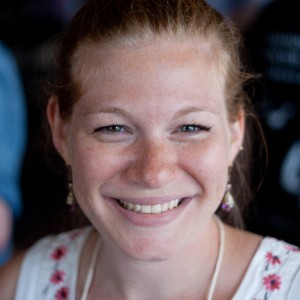- Published on
Hi there! My name is Whitney Hess and I'm a self-development coach and writer. Thank you for taking the time to learn a bit more about me.
How did you get start coaching and writing? What is your background?
I've been a writer my entire life; it's my first and greatest passion. But as a little girl who loved computers and logic problems, my teachers and my family always pushed me towards math and science. After four years of computer science in high school (taking the one class my school offered over and over again), I was accepted to Carnegie Mellon University's School of Computer Science — a minor miracle given my grades.
A few painful weeks into my freshman year, spent hunting for misplaced semicolons, I was already questioning my decision. Meanwhile in my required Writing 101 course, I had a professor who was encouraging my writing for the first time. By the middle of my sophomore year, I traded in code for English, and have never regretted it since.
I ended up majoring in Professional Writing (which I like to call "journalism and more") and soon after picked up a second major in Human-Computer Interaction (a program the course catalog described as "a synthesis of Computer Science, Design, Psychology and Statistics" — yes, please!). By the time I left CMU, I had a Masters in HCI and a determination to help make technology easier and more pleasurable to use through the power of clear communication.
I have spent my entire career in User Experience as a designer, researcher and strategist. For the last 10 years, I've run my own business helping Fortune 500s, well-funded startups, and non-profit institutions establish and strengthen the UX practices within their organizations. Since 2013, I've shifted away from consulting (give a fish) towards coaching (teach to fish), providing significantly longer-term value to my clients while being far more scalable and sustainable for me.
Now as a certified professional coach, I offer leadership coaching for new managers, career coaching for dissatisfied practitioners, and UX training for creative professionals and product teams. I'm deeply fortunate to do most of my work remotely, enabling me to support passionate people all over the world.
What are you working on now?
In early 2015, I launched my first group coaching program called Plot Your Course, a 10-week intensive on designing your own career. In addition to my private coaching with individuals and corporations, I continue to offer PYC twice a year. I am also in the process of developing group coaching programs on self-compassion for leaders, personal power for women in tech, and nonviolent communication in the workplace.
What software do you use for your work?
My favorite software is empathy, the quality of presence and connection. The ability to feel another person's feelings and understand their underlying needs gives us the opportunity to more effectively and meaningfully serve them. I believe in living life in service to others, treating all beings with respect and care. Empathy is a language that facilitates my life's mission to put humanity back into business.
And what hardware?
Eyes and ears; nose, tongue and hands. Our senses are antennas, scanning for messages transmitted from everyone and everything around us. The more we can quiet our noisy minds, the better and clearer signals we're able to detect and absorb.
What is your ideal work environment?
Naked, on the couch ;) My partner Fredrick and I live aboard our 37-foot sailboat named Jenny, currently docked in San Diego, CA. With less than 200 square feet of living space, we've had to learn how to live a much simpler, more streamlined lifestyle. It has been the greatest adventure of my life, and I can't think of a more ideal, more comforting, safer place to do my life's work. As I write this, we are currently traveling (without Jenny, sadly) throughout the US, Europe, and Central America looking for a new marina for all three of us to call home. I'm not-so-secretly hoping a special, water-loving puppy will somehow make her way into our lives along the way.
Who are the creatives you admire most?
Fredrick is my greatest inspiration. As a professional chef, he makes memories with food. His raw materials are so ephemeral, and his art disappears moments after the finished product is served. And yet he lets it all go with such joy and ease. I aspire to be less attached to the outcomes of my work, and focus more on the connections it creates — between us and within us.
